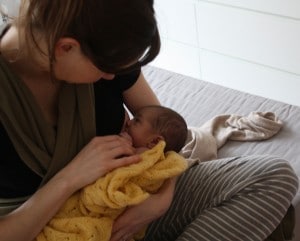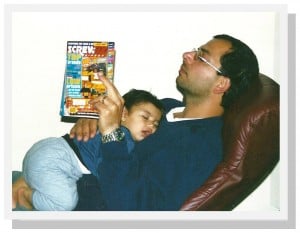Why Is It Not Ok to Let Baby Boys Cry
One of the biggest adjustments a new mother may take to brand is to realise that babies can demand their mothers twenty-4 hours a twenty-four hour period. From the moment a woman gives birth she can find herself bombarded with a vast array of ideas and suggestions, and this can lead to defoliation on what she might expect.
In particular, where, when and how much a baby should slumber is the subject area of much defoliation and contradiction. Parents may accept been given unrealistic data on how much a babe will sleep, and their expectations might not exist developmentally or physically advisable. The babe may be labelled as having a sleep problem when, in fact, he is exhibiting normal behaviour.

Questionable methodology of studies which suggest babies should be left to cry
LLLGB disagrees with the methodological approach and the conclusions of a study from Flinders University in Adelaide, Commonwealth of australia, which was recently published in the periodical Pediatrics.ane The researchers studied 43 sets of parents, with babies betwixt 6 and 16 months, who felt their child was having problems sleeping. They divided the group into three sets: 1 group was asked to get out the child and wait longer and longer earlier going dorsum to comfort him (graduated extinction); the 2nd group was able to stay in the room until the child dozed off (bedtime fading); and the control grouping did not effort any slumber grooming.
After three months, the researchers found that the babies in the outset two groups barbarous asleep more quickly and woke less during the night. They tested for levels of cortisol, a stress hormone, and found that babies had lower levels during slumber grooming interventions at the fourth dimension they were tested. Moreover, one yr after the interventions, parents didn't written report more behavioural problems compared with the babies in the control group. Michael Gradisar, Acquaintance Professor of Psychology at Flinders University, said there was no prove that "crying it out" was stressful for babies, and that he believed it gave peace of listen surrounding bedtime.2
This written report echoes research led by Psychology Professor Marsha Weinraub of Temple University in Philadelphia, published in Developmental Psychology in November 2012.3
Weinraub was quoted as welcoming the Flinders report and she said that the gains in sleep would assist both babies and parents. She added that the virtually important attribute of the study is that both sleep training techniques seem safe for babies in the short and long term, and that the written report disproves expert opinions virtually the detrimental long-term effects of sleep training methods in terms of children'south stress levels and problematic behaviours. However, Professor Gradisar himself mentioned that while sleep training appears to improve sleep without detriment on the kid or family, more contained trials are needed to validate the findings of his study.four

Measuring Stress
New parents who are feeling sleep deprived and are dislocated on whether to go out their baby to cry could be misguided by this new research, and information technology is therefore important to stress that when the study is looked at in particular, the results are not as positive as they may at first seem.
In order to measure the babies' stress, the researchers tested their levels of cortisol, but these tests were done in the morning, and there is no style of knowing but how stressed the babies were while they were crying themselves to sleep, or if their sleep would accept been any different if they had fallen comatose in a calm country. In add-on, when follow-up tests for cortisol levels and to gather sleep information were conducted at 1 and 3 months, only 28 and 23 participants respectively out of the initial 43 were included in the study. Although the total 43 participants were included in the 12 months follow-up tests, the modest numbers in the various groups could mean that any differences and effects might not have been detected. The study also neglected to record data such as the babies' feeding method, sleep arrangements, and if they were in any sort of day care.v
Claims that babies need to cry
Some popular baby care manuals in the commencement half of the 1900s gave mothers a very unrealistic thought of how much babies needed to sleep, and some of the baby 'experts' of that era were convinced that babies needed to cry. Information technology was thought that a baby's lungs didn't fully expand unless they were exercised every day. Mothers were terrified with the tale of a infant who died of pneumonia at the age of 8 months because he had never been allowed to weep.half-dozen
Leaving babies to cry considering it is supposedly skillful for them is a long way from the calmness we aim for today, and nonetheless, some modernistic twenty-four hour period 'gurus' still cling to this idea. In her recently republished book, The Baby Book, maternity nurse Rachel Waddilove says she teaches mothers that it is ok for babies to cry. In a comment which could be an echo of the misinformed statements of the 20th century, she says: "Very often a baby's normal mode to get to sleep is to take a shout, air their lungs. If y'all rush to them yous interrupt the pattern of them falling asleep".seven It would be considered very distressing for an adult to weep themselves to slumber each night, and the same is truthful for a vulnerable infant calling out for his parents in the only way he tin can.
Leaving a baby to weep may, possibly, give short-term relief to the family unit who may get a improve dark's rest. However, there are many studies which disagree strongly with the claim that leaving a baby to cry is not stressful. The 1999 Ontario Early Years Studyviiiexplains how the brain is existence hard-wired in early on evolution and how the patterns which emerge will last for a lifetime. How the adult encephalon reacts to stress is influenced by this early development, and adults who were stressed equally babies can have aberrant stress reactions in subsequently life, likewise as a greater vulnerability to social attachment disorders.

In 1998, Harvard research showed that babies who cried excessively were susceptible to stress as adults, and sensitive to future trauma.9 Chronic stress in infancy tin also pb to an over-active adrenaline arrangement, causing anti-social and aggressive behavior, and even touch on concrete illness far into the future.
While the Flinders study claims to have found no sick furnishings, the participants would need to be monitored for many years into the future for this to be clearer.
On the other hand, research has shown that infants and toddlers who experienced responsive and sensitive care tend to develop into socially competent pre-schoolers.ten
Are there any sleep training gains?
The Flinders study found that, afterwards three months, babies in the cry-information technology-out group fell comatose almost 15 minutes faster than babies in the control group, and those in the bedtime fading group went to sleep nearly 12 minutes faster. Commenting on the Flinders study, Professor Weinraub said: "When you are waiting for your baby to go to sleep, every minute counts"xi, simply this assumes that the fourth dimension spent with a infant is something to be wished away. The Flinders written report also institute that, one twelvemonth subsequently the interventions, babies in all three groups had about the same amount of sleep because sleep wellness improves naturally as babies get older. This would seem to indicate that babies would have started sleeping more without whatsoever intervention.
It is not easy for mothers to leave their baby to weep. It isn't meant to be. A baby's weep is intended to arm-twist a response from its caregiver. It is extremely sorry for a mother to heed to her infant calling for her and yet to believe that not responding is the all-time affair for their child, even when it seems and so wrong.
Leaving a breastfed baby to cry may modify normal feeding patterns, and unnaturally longer sleep patterns may touch the protection regular waking gives babies in regulating their breathing. There seems to be very niggling gained past leaving a baby to cry, and a very small, brusk-term increase in sleep time would have to be balanced against the stress caused to both parents and infants.

"Self-soothing"
Many proponents of sleep preparation claim that information technology is really important for babies to learn to fall comatose on their ain. Professor Weinraub says: "When mothers melody in to these night fourth dimension awakenings and/or if a baby is in the addiction of falling asleep during breastfeeding, then he or she may not be learning how to self-soothe, something that is disquisitional for regular slumber".12
While babies may indeed stop crying if left unattended long enough, they are not learning to self-soothe, they are simply giving up on the promise that comfort volition come. The term "self-soothing" was invented in the 1970s during previous research by Dr. Thomas Anders, just it has come up to be adopted as a fact rather than a enquiry term, with far more than meaning than was intended. There is no fashion of knowing if, when babies finish crying, they have fallen comatose or have simply gone into a "withdrawn" state where they have given up hope of being responded to.thirteen
Information technology's interesting to note that adults in relationships relish being close to each other and sleeping in the aforementioned bed. It is comforting to wake in the night and feel the presence of someone we love next to united states. It raises the question of why a infant or kid should exist expected to sleep alone, left to cry and "self-soothe" when adults aren't.
Should babies be expected to sleep through the dark?
The Flinders study assumes information technology is normal to expect babies to slumber through the night by themselves by a certain historic period. Notwithstanding, in many cultures, co-sleeping and breastfeeding are the norm. The idea of putting a baby to sleep in his own room alone has only been considered normal in industrialised Western societies over the terminal hundred years or so. We may have changed our expectations of what is normal, simply a infant's need for his mother's milk and proximity to her body remains the same.
Professor James McKenna of the University Of Notre Matriarch, Indiana, says that human babies are born developmentally immature and require parental (especially maternal) aroma, affect, sounds, and motility in gild to feel secure and have their physical needs met at an optimal levelxiv. All primate infants, including humans, biologically expect to be in shut contact and proximity with their caregivers.
For hundreds of thousands of years mothers have effectively combined co-sleeping and breastfeeding to provide for their babies' immediate social, psychological, and concrete needs.
According to James McKenna, mothers and babies who sleep with or close to each other develop coordinated sleep patterns, and so it is ofttimes much easier to wake when the baby needs feeding or comforting and to fall dorsum to slumber afterwards.
When deprived of the physical comfort she needs, a baby will employ her primary survival response — crying to attempt to attract the attention of her parents. By using weep-it-out methods to train their babies to sleep, parents are severing the link between crying and response. They are ignoring the very affair which is meant to ensure an baby'due south survival.
What about parents?
Looking later a new baby can feel exhausting. Weinraub's 2012 written report claimed that mothers of babies who woke persistently were more likely to be depressed, although it recognised this needed farther research.
In fact, contempo inquiry by Kathleen Kendall-Tackett indicates that mothers who were exclusively breastfeeding reported significantly more hours of sleep, better physical wellness, more energy, and lower rates of low than mothers who were mixed- or formula-feeding.15
One of the things many parents notice useful is to know that what they are experiencing is normal. Just knowing that they are non alone and that night waking is something many others experience can make all the difference. When parents are led to expect that babies should sleep through the nighttime at a sure age, that they should larn to sleep on their own and 'self-soothe', parenting doubts and concerns can arise. It can be helpful to talk to other parents who understand their difficulties, including those who accept seen their children develop and start sleeping through the nighttime when they are fix. The age at which this happens will vary greatly from child to child and labelling a child who wakes up as having a "sleep trouble" tin can exist misleading.

If a female parent is feeling exhausted, it may help to look at the family unit'south life as a whole and inquire if anything can exist done to make it easier. Are there times in the day when the mother might be able to make time to sleep? Perhaps a trusted friend or family member could be asked to come to the house and keep an eye on the babe for an hour or so in the day while the mother has a rest, or give a hand with household tasks. Taking a brusque interruption to do something she enjoys, or even having a relaxing bathroom, can revitalise her and make it easier to give fourth dimension to the baby. Knowing that night waking is normal and will pass helps to create a more positive feeling. Believing that it is incorrect and you should be doing something about it builds negativity.
Many parents already instinctively stay with their baby while he falls asleep and avoid stressful crying. Some mothers likewise decide to go on their baby right abreast them during the dark and observe this much easier than attempting an unrealistic bedtime routine.
Making a decision which feels right
All parents need to make choices which experience right to them, basing their decisions on authentic information. While "experts" may assure parents that they shouldn't feel guilty virtually not comforting their babies when they are crying, many parents find their instinct to go to their child is difficult to ignore. In her study, Weinraub says that parents should "resist the urge to respond right away to awakenings".xvi Ideally, this kind of decision would be based on what the parents feel is best for them and their own baby, rather than academic advice.
La Leche League GB
LLL accredited Leaders are mothers who have breastfed their ain babies and know that when a mother needs a bit of help it can't wait until tomorrow. They provide telephone counselling, email back up and local group meetings, with leaflets on a wide range of breastfeeding questions, information on more unusual situations, access to a panel of professional medical advisors, and books covering various aspects of pregnancy and child care.
Written by Anna Burbidge, 2016
Resources and further reading
LLLGB resources
Safe slumber and the breastfed baby
I need some slumber!
Purchase Sugariness Sleep from the LLLGB Shop
Buy Sleeping With Your Babe by James McKenna from the LLLGB Shop
LLLI articles
The Rubber Slumber Seven
Why Babies Tears Make Us Cry & Why They Matter
Cry Information technology Out
Other resources
www.basisonline.org.great britain
1 Michael Gradisar, Kate Jackson, Nicola J. Spurrier, Joyce Gibson, Justine Whitham, Anne Sved Williams, Robyn Dolby, David J. Kennaway: "Behavioral Interventions for Infant Sleep Problems: A Randomized Controlled Trial", Pediatrics, May 2016 (http://pediatrics.aappublications.org/content/early on/2016/05/21/peds.2015-1486)
two http://edition.cnn.com/2016/05/24/wellness/cry-it-out-slumber-training-ok/
3 Weinraub M1, Bough RH, Friedman SL, Susman EJ, Knoke B, Bradley R, Houts R, Williams J.: "Patterns of developmental change in infants' nighttime slumber awakenings from 6 through 36 months of age.", Dev Psychol. 2012 Nov;48(vi):1511-28. (http://www.ncbi.nlm.nih.gov/pubmed/22448981)
4 http://blogs.flinders.edu.au/flinders-news/2016/05/25/sleep-research-offers-assistance-for-babies-and-parents/
fivehttp://evolutionaryparenting.com/controlled-crying-cortisol-and-attachment-a-disquisitional-await/
6 Mrs Frankenburg, Common Sense in the Nursery, (1922, 34, 54)
7 http://www.telegraph.co.uk/women/family unit/celebrity-maternity-nurse-modern-mothers-have-lost-the-plot/
eight Early Years Study, Margaret McCain and J. Fraser Mustard 1999 (http://www.children.gov.on.ca/htdocs/English/documents/topics/earlychildhood/early_years_study-1999.doc)
nine http://news.harvard.edu/gazette/1998/04.09/ChildrenNeedTou.html
ten Megan R. Gunnar, Erin Kryzer, Mark J. Van Ryzin, and Deborah A. Phillips: "The Rise in Cortisol in Family unit Daycare: Associations With Aspects of Care Quality, Child Behavior, and Kid Sex", Child Dev. 2010 May-Jun; 81(3): 851–869. (http://www.ncbi.nlm.nih.gov/pmc/manufactures/PMC2946618)
11 http://edition.cnn.com/2016/05/24/health/weep-it-out-sleep-preparation-ok/
12 https://www.sciencedaily.com/releases/2013/01/130102161811.htm
13 https://www.isisonline.org.united kingdom/how_babies_sleep/sleep_training/considerations/
fourteen http://cosleeping.nd.edu/
fifteen http://www.kathleenkendall-tackett.com/kendall-tackett_sleep_disturbances.pdf
16 http://news.temple.edu/news/2012-12-13/let-crying-babes-lie-report-supports-notion-leaving-infants-cry-themselves-back-sleep
Source: https://www.laleche.org.uk/letting-babies-cry-facts-behind-studies/
0 Response to "Why Is It Not Ok to Let Baby Boys Cry"
Postar um comentário